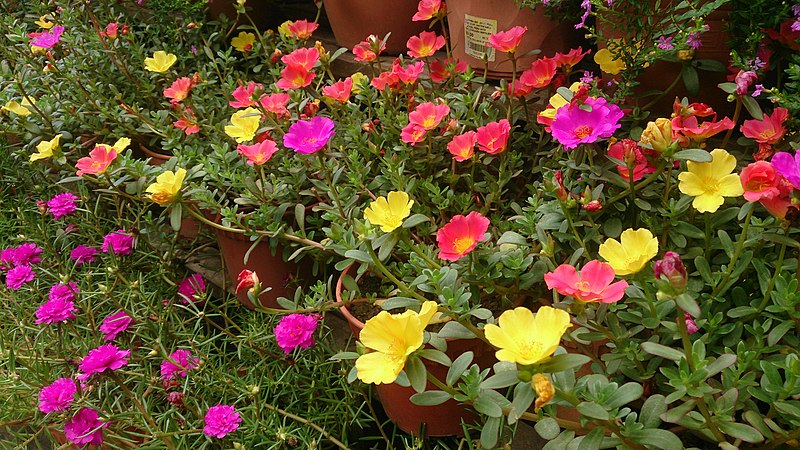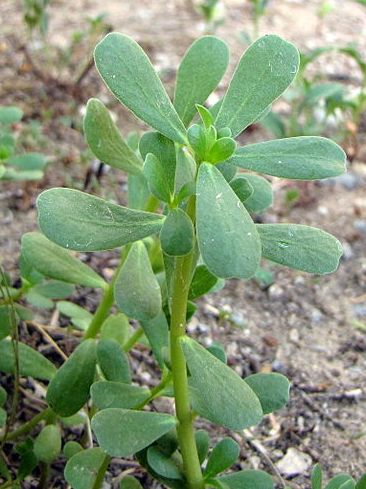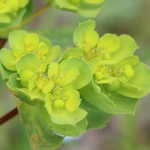Purslane is an herb that has often been considered a weed. However, packed with power, the health benefits of purslane are potent.
In addition to being rich in vitamins and minerals, purslane is thought to help defend against cancer, cardiovascular disease, and a number of other chronic illnesses and ailments.
If you’ve never heard about the amazing health benefits of this overlooked herb before, read on!

Mokkie, CC BY-SA 3.0, via Wikimedia Commons
Potential Health Benefits Of Purslane
Studies have shown that consuming purslane (food or supplement) can have potential health benefits in several areas:
- cardiovascular health
- cancer prevention/treatment
- joint pain relief/prevention
- diabetes management/prevention
- improved brain function/memory retention
- skin health/wound healing
While more studies need to be conducted to prove any direct causal relationships between purslane and these potential outcomes – there are some early indications that suggest this nutrient-rich herb may improve overall health in multiple ways.
Nutritional Value of Purslane
The most notable health benefit of purslane is its nutritional value; it contains a more significant amount of vitamins A and C, calcium, iron, magnesium, potassium, antioxidants, and omega-3 fatty acids than most other vegetables, such as carrots, or spinach!
It also contains several other essential vitamins and minerals such as thiamin (B1), riboflavin (B2), niacin (B3), vitamin B6 (pyridoxine), folate (B9), pantothenic acid (B5), choline, betaine and lutein/zeaxanthin. All these nutrients make purslane an excellent source for natural nutrition.
Though still largely unknown among the general public despite its wealth of beneficial properties – purslane is slowly gaining recognition as a powerful medicinal herb with numerous potential applications for treating various ailments both physical and mental alike.
Health Benefits of Purselane for Your Skin

ZooFari, CC BY-SA 3.0, via Wikimedia Commons (image is cropped)
This plant has long been used in herbal medicine for its soothing properties. Additionally, research suggests that purselane’s active compounds may help speed up the healing process.
Known best for its cosmetic uses, this wonder ingredient, purselane, can not only help you fight wrinkles, but also potentially moisturize and brighten your complexion.
But its skincare benefits don’t end there.
Research has actually linked purslane to providing your skin with proteins and vital nutrients such as omega-3 fatty acids, as well as vitamin E and coenzyme Q10, making it a powerhouse ingredient for all-round nourishment and protection. Whether you use it in its raw form or mix it into your skincare routine to make an organic face cream, purslane promises greater skin health!
Plus, purselane oil can act as an anti-inflammatory when applied to the skin. It can even reduce the very unpleasant symptoms of lichen planus, which Lichen planus is a chronic skin condition characterized by itchy rashes, which can be inconvenient, irritating, and uncomfortable. It also works for such oral conditions. Fortunately, nature provided a viable solution in purselane.
So, if lichen planus is causing you distress, why not give purselane a try? Thanks to its gentle and calming effect on the skin, it may just offer you some relief!
Benefits of Purslane for Eye Health
With the strain that modern life inevitably places on our eyes, having a natural, restorative remedy can be an essential supplement for eye health and comfort. Purselane herb has long been known as a beneficiary of ocular wellness.
Whether it is brewed up in tea, consumed with food, or taken in capsule form, this sharp-tasting herb can offer a wealth of comforting and supportive properties that make your eyes feel refreshed—naturally! All at once revitalizing and relaxing, providing support to the overall functioning of the eye muscles, purselane makes an herbaceous and delightful inclusion to your routine, which promisingly aids to mollifying any discomfort experienced with eye overuse.
Purslane Plant
Purslane, also known as pigweed, is a flowering plant from the Portulacaceae family. It’s native to India but can be found all over the world. This small herb has reddish stems with thick leaves that are usually smooth on top and covered in small hairs underneath.

(Spurges) Björn S…, CC BY-SA 2.0, via Wikimedia Commons (image cropped)
It grows quickly and spreads easily; most people consider it a weed because it tends to take over patches of soil where it grows.
Caution: Picking wild purslane may seem like a good idea, however it can be difficult to discern the difference between purslane and spurge. If even one small detail is missed, consuming this type of hazardous foliage could prove detrimental due to its poisonous nature.
Whether you’re looking for natural ways to improve your overall well-being or just want to add another nutrient-rich food into your diet – looking into adding some purselane into the mix could be an excellent choice!
Taste:
Wondering about the taste of this versatile herb?
Purslane is a unique vegetable with a flavor like no other. With its distinctive crisp texture, it has been described as having salty, lemony, nutty, with peppery notes that tantalize the taste buds. The succulent succulence of purslane adds an undeniably delightful bite to any dish. Whether it’s mixed into a bowl of fresh greens or served as a side dish to your favorite entrée, this pleasantly scrumptious treat is sure to please!
Precautions & Potential Side Effects
While Purselane’s benefits for supporting your overall health have been touted for centuries, seeking advice from a medical professional is always recommended before taking purslane supplements in order to ensure that no adverse side effects occur.
Possible side effects may include digestive issues such as nausea and diarrhea, as well as headaches, drowsiness and joint pain.
Dues to its higher levels of oxalates, purslane can contribute to the formation of kidney stones for those prone to them, or those with existing kidney disease. In either case, adding purslane to your diet should be undertaken only with great care and full knowledge of the consequences.
In addition, those with existing heart or immune system diseases should consult their doctor before consuming purslane, as it can interact with other medications being taken at the same time.
